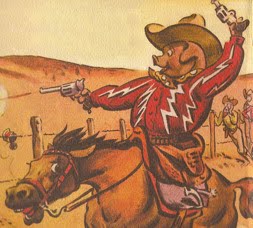Top Tips for Collecting Rare Books by Walter R Brooks
By Vic Zoschak
When Walter R Brooks published To and Again in 1927,
he had no idea that the children's novel would grow into a beloved series of 26
books. Indeed, the novel (later retitled Freddy Goes to Florida) proved
a pivotal work in Brooks' career as an author. To this day, Brooks has a
devoted following, as evidenced by groups like Friends of Freddy. If you're a
fan of Brooks, you may find yourself building a collection of Freddy the Pig
books and related works. As you delve into the world of collecting rare books,
keep these guidelines in mind.
·
Remember that condition is everything. The
value of a rare book is directly affected by its condition. If you're building
a Freddy collection, focus on buying the best copies you can afford: both the
book itself and the original dust jacket should be as pristine as possible. The
dust jackets of Freddy books are particularly appealing, which simply makes an
edition with the dust jacket more visually appealing. But moreover, the dust
jacket makes the book "complete."
·
Learn how to identify a first edition. Collectors
value true first editions most highly. The Freddy series was published by
Alfred A Knopf between 1927 and 1958. From 1927 to 1932 or 1933, the publisher
would include "second printing," "third printing," etc to
indicate subsequent editions. The first edition lacks this on the copyright
page. Around 1933, Knopf issued a new statement, saying that "First
Edition" or "First American Edition" would be denoted on the
copyright page. For more information on first edition identification, consult
Zempel and Verkler's First Editions.
·
Remember alternate titles. Several books
in the Freddy series were published under one title, then renamed for
subsequent editions. A truly complete collection would include first printings
of both titles:
▪
To and Again was later published as Freddy
Goes to Florida.
▪
More To and Again was reissued as Freddy
Goes to the North Pole.
▪
The Story of Freginald was republished as
Freddy and Freginald.
▪
The Clockwork Twin was later published as
Freddy and the Clockwork Twin.
▪
Wiggins for President was retitled Freddy
the Politician.
·
Explore Brooks' other works. Brooks
enjoyed an active career as a literary critic and columnist. He also published
over 100 short stories for various magazines. These kinds of articles are
fascinating additions to a Walter R Brooks collection because they add both
depth and dimension. They may also be more difficult to locate and obtain,
giving the collector a satisfying "treasure hunt"!
·
When in doubt, consult an expert. Fans of
Freddy are lucky to have an active community of fellow enthusiasts--who are
also excellent resources. Reach out to others who can share their knowledge
with you. And if you have questions about collecting rare books, be sure to
talk to a reputable dealer. You can find qualified rare book dealers through
professional organizations like the Antiquarian
Booksellers Association of America (ABAA).
